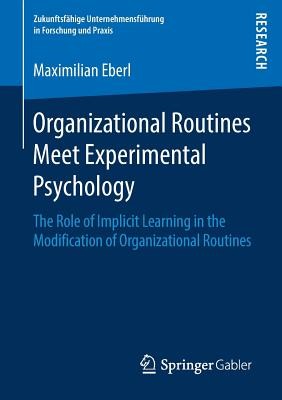
- We will send in 10–14 business days.
- Author: Maximilian Eberl
- Publisher: Springer Gabler
- ISBN-10: 3658235616
- ISBN-13: 9783658235611
- Format: 14.8 x 21 x 1.1 cm, softcover
- Language: English
- SAVE -10% with code: EXTRA
Organizational Routines Meet Experimental Psychology (e-book) (used book) | bookbook.eu
Reviews
Description
Using an experimental approach, Maximilian Eberl evaluates the role of implicit learning (CBM/AAT) for the modification of organizational routines. Taking a vertical perspective on the (collective) entities in organizations shows an increasing role of impulsive processes the lower the level gets. The horizontal perspective demonstrates the potential of implicit learning for the replication of routines. Finally, the time perspective highlights the contributions of implicit learning strategies for change in and of routines, as well as the contributions of implicit learning to deal with the path-dependence of routines.
EXTRA 10 % discount with code: EXTRA
The promotion ends in 20d.16:44:10
The discount code is valid when purchasing from 10 €. Discounts do not stack.
- Author: Maximilian Eberl
- Publisher: Springer Gabler
- ISBN-10: 3658235616
- ISBN-13: 9783658235611
- Format: 14.8 x 21 x 1.1 cm, softcover
- Language: English English
Using an experimental approach, Maximilian Eberl evaluates the role of implicit learning (CBM/AAT) for the modification of organizational routines. Taking a vertical perspective on the (collective) entities in organizations shows an increasing role of impulsive processes the lower the level gets. The horizontal perspective demonstrates the potential of implicit learning for the replication of routines. Finally, the time perspective highlights the contributions of implicit learning strategies for change in and of routines, as well as the contributions of implicit learning to deal with the path-dependence of routines.


Reviews